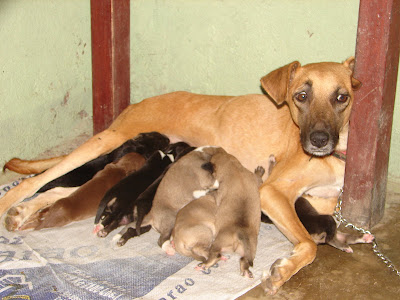In addition to our language classes and co-teaching, the other major part of Peace Corps training is having a youth group. The first week we had to seek out members of our youth group, and our goal during the eleven weeks of training is to complete some sort of project with the group. I am facilitating the group with the other trainee in my Spanish class and we were really fortunate to have kids in our host families that are of youth group age that we could 1) guilt into being in our youth group and 2) guilt into helping us recruit more jóvenes (youth) to be in the group as well. Some youth groups sort of flop after a few weeks (the Peace Corps tells us often that it is what we learn—not the outcome—that matters with our youth groups), but I’ve been really pleased with the enthusiasm and initiative of our kids.
We have usually around 11 kids in our group ranging from age 13 to 18. We play lots of dinámicas (ice breakers/games) with them and also have to give them charlas (talks) in Spanish about issues like AIDS or how to prepare for a job interview in Nicaragua. The main purpose of the group, however, is our project. The project is supposed to be something the group wants to do (we are just facilitators to help them along)—it can be a project to plant trees in the town, pick up trash, make a book about the town, have a soccer tournament, or whatever. Our group eventually decided to make a new sign to go at the edge of our town welcoming everyone to our pueblo. The one that’s currently there is just a regular looking green highway sign, but it’s really old and rusted-through. After picking the project, we had to figure out how much it was going to cost, how to raise that money, and we had to figure out a timetable to complete all the steps we’d need.
Right now we’re at the stage of raising the money for the rótulo (sign); originally we thought that the whole project would cost about 600 córdobas (about $33), but when we went to the alcaldía (mayor’s office) to get permission for the project, the vice-mayor told us that our idea of painting a piece of pine wood was a bad one because it would weather too quickly, so he offered to give us a piece of metal to use instead. That was really awesome because it takes some of the pressure off of needing to raise a lot of money. All we needed to do, then, was raise the money for the paint and brushes and we did that by having a rifa and a venta de sopa.
For the rifa (raffle), the kids all brought items that their families (especially families that have pulperias) donated to make a canasta básica, or a basket of stuff. The items in our basket include rice, beans, sugar, soap, toilet paper, soup, bread, and a variety of other odds and ends. Each kid then has a paper with 15 numbered lines on it, and for 3 cords a person can pick which number they’d like and write their name on that line to act as their raffle ticket. Once the rifa was over, we eliminated papers and them numbers until we wound up with our winner, who happened to be my host nephew Walter from our youth group (it was fair and square, I promise).
The second fundraiser was a venta de sopa (soup sale) that we did two weekends ago. The kids all pitched in to donate vegetables and ingredients for soup, then that Sunday morning we went to one of their houses to make a huge batch of soup. While the soup was cooking, we broke up into groups and walked door to door telling everyone that we were making soup, that it would be ready at 11:00, and that it cost 15 cords. If a person wanted to buy soup, he or she gave us some sort of bucket, bowl, or thermos and we wrote the family’s name on a piece of tape and stuck it to the bucket. When the soup was ready, we filled up all the buckets, delivered the soup back to each house, and collected the money. We sold all of the soup we made very quickly (I wasn’t sure how many people would want to buy hot vegetable soup on the day that I got a sunburn from walking door to door), but everything worked out. Our only problem was that a lot of people forgot to bring their ingredients, so we had to buy a lot of things; that significantly cut our profit from the venta. However, I think it was still a success.
We purchased our paint and have now painted the primer and the base coat (yellow). Tomorrow we'll paint the letters on the sign, then we just need to add our drawings. I'll be sure to post pictures when it's done!
Read more...


















